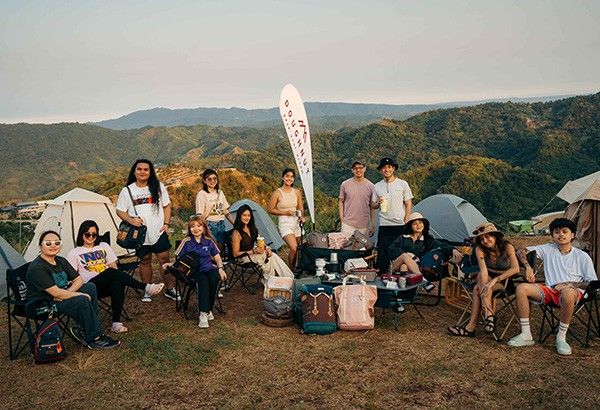Apple peel, Budweiser beer waste converted into Doughnut bags

MANILA, Philippines — For every 100 liters of beer brewed, 20 kilograms of beer waste is reportedly produced.
But thanks to a new technology, beer drinkers would now have more reasons to feel less guilty for every bottom’s up.
Apple peel and beer waste are among the recycled materials now being used to make the bags of Hong Kong label Doughnut.
Doughnut Philippines Brand Manager Luigi Wilwayco recently unveiled the brand’s new collection of bags made from recycled materials at the Summer Happy Camp in Viewscape Nature Park in Tanay, Rizal.
Doughnut, said Wilwayco, was founded in 2010 and came to the Philippines at around 2015.
“Our bags are well-known for having the almost Japanese-style aesthetic in styling… they have many compartments and pockets for storage. A lot of our bags are minimalistic in design, but when you open them, you would be surprised that they have a lot of functionality,” he added.
In 2018, the brand started using more sustainable materials and processes, he said.
Crafted from recycled polyester and featuring upcycled leather trimming made from Barley Skin — an innovative material developed by VegaTex and Budweiser Asia Pacific from beer waste — Doughnut’s eco-friendly bags include the Dreamwalker, Jungle II, and Happy Camper series.
Every bag, said Wilwayco, contains about a liter of recycled beer waste. Vegatex Apple Skin Vegan Leather, meanwhile, is made from organic waste peels and residues from fruit juice plants.
Be it a short overnight stay or an extended retreat, the bags from Dreamwalker Series, a newcomer in Doughnut’s selections, offer convenience and compactness. For quick errands or concerts, there is the Pyramid Tiny bag or the Seattle bag.
Designed to complement the outdoors, the Explorer, Wares (which can be carried as a backpack or tote), Grounder, Christopher, and Colorado bags are cabin-friendly and ideal for carry-on.
For daily use, there are medium-sized options such as the Pyramid (carry it as a backpack, a crossbody, with an added feature of also including a hanging toiletry pack), the Plus One Mini, or the Christopher Small bag that features a roll-top closure with buckle to easily expand space as needed.
Crafted sustainably with recycled polyester, apple-peel skin vegan recycled leather, repurposed logo lining, and upcycled excess fabric from the factory, Happy Camper series bags are water-repellent and with adjustable straps for comfort.
The series introduces two new styles: the Binocular, a versatile 2-in-1 cross-body bag with a padded compartment for gadgets and a detachable pouch for essentials, complete with a metal closure that can serve as a screwdriver and bottle opener; and the Hammock, offering the same 2-in-1 feature, but in a backpack, or sling bag design. The existing styles under this series include the Colorado backpack, which has a gadget pouch, while the Pyramid offers multiple carrying options, doubling as a backpack, cross-body, or hanging toiletry pack for camping or hotel stays.
Created for environmentally-conscious adventurers who prefer to blend in seamlessly with nature, the Jungle II Series collection showcases a palette of neutral, earthy tones. The bags incorporate recycled materials like 420D Nylonplus Recycled Ocean Waste Nylon and recycled linings, aiming to minimize waste and achieve zero emissions in the production process.
Doughnut’s summer 2024 collection is now available in stores in Glorietta 3, SM Mall of Asia, SM Megamall, SM Pampanga, SM Santa Rosa, SM Seaside, TriNoma, Ayala Malls Manila Bay, Ayala Malls Central Bloc, select SM Department Stores, and select Rustan’s stores, and online via Doughnutphilippines.com, LazMall, Shopee Mall, and Zalora.
Another Doughnut bag material, 600D recycled polyester or RPET, is made of recycled discarded fishing nets, said Wilwayco.
“Usually, when (fishing nets) are already very worn out, fishermen usually just through these nets overboard. The problem with that, once they throw it overboard, these nets get entangled with marine life…” Wilwayco explained.
Thus, instead of disposing such materials, he suggested sending these to proper avenues for recycling.




















